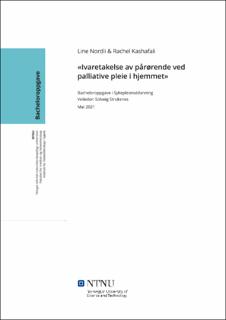| dc.contributor.advisor | Struksnes, Solveig | |
| dc.contributor.author | Nordli, Line | |
| dc.contributor.author | Kashafali, Rachel | |
| dc.date.accessioned | 2021-09-24T19:51:51Z | |
| dc.date.available | 2021-09-24T19:51:51Z | |
| dc.date.issued | 2021 | |
| dc.identifier | no.ntnu:inspera:77258684:81467825 | |
| dc.identifier.uri | https://hdl.handle.net/11250/2782370 | |
| dc.description.abstract | Bakgrunn: Det er viktig å rette fokus til pårørendes psykiske helse, også i eget hjem, hvor pårørende har en enda større rolle, og helsepersonell møter dem på hjemme-bane.
Hensikt: Vil vi diskutere de psykologiske parameterene som har innvirkning på pårørendes psykiske helse, hvilke muligheter som ligger sykelpeieren til grunne, og på hvilken måte vi kan ivareta, styrke og støtte pårørened gjennom denne fasen.
Metode: Oppgaven baserer seg på kunnskap fra vitenskaplige artikler som er nærliggende temaet, samt annerkjent faglitteratur og fagartikler.
Funn: Pårørende til palliative pasienter opplever et høyere nivå av stress og angst enn den generelle befolkningen, samt en lavere evne til å ivare egenomsorg. Sykepleiere finner det ofte vanskelig å innlede gode samtaler med pårørende. Det er blant annet grunnet manglende planlegging, lite fokus på kartlegging, underbemanningen, manglende kunnskap og ferdighet til hvodan man skal innlede til slike samtaler. Samt evne og muligheter til å håndtering etiske dilemmaer som oppstår mellom sykepleier, pasient og pårørende.
Konklusjon: Sykepleiers systematiske og målrettede arbeid, gjennom kartlegging og oppfølging kan føre til bedre mestring for den pårørende. Dette reduserer psykiske symptomer, som fører til bedre håndtering av situasjonen, samt at det gjøre dem til bedre støttespillere for pasienten og sykepleierene. | |
| dc.description.abstract | Background: It is important to focus on the relatives’ mental health to help enable them in contributing to the patients' care. Relatives are often the best support person, for both patients and nurses, in the patients palliative phase.
Purpose: We will discuss the psychological parameters that have an impact on relatives, what attributes the relatives may have that can be useful, and how nurses can take care of, strengthen and support them.
Method: This thesis is based on knowledge gathered through relevant scientific articles, as well as recognized literature and subject articles.
Findings: Relatives of palliative care patients experience a higher level of stress, anxiety and ability for self-care than the general population. Nurses often find it difficult to initiate good and useful conversations with relatives. This can be due to a lack of planning and mapping of the relative's needs, understaffing, a lack of knowledge and skills on how to initiate such conversations, as well as the ability or opportunities to handle ethical dilemmas that arise between the nurse, patient and relatives.
Conclusion: Systematic and targeted work, through mapping-out and follow-up, can help ease the strain for the relative, can reduce mental problems, and thus make them better capable to handle the situastions, aswell as better supporters for both the patient and the nurses. | |
| dc.language | nob | |
| dc.publisher | NTNU | |
| dc.title | «Ivaretakelse av pårørende ved palliative pleie i hjemmet» | |
| dc.type | Bachelor thesis | |
